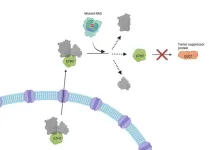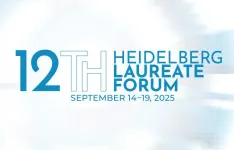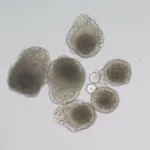(Press-News.org) Researchers at Baylor College of Medicine, the Jan and Dan Duncan Neurological Research Institute (Duncan NRI) at Texas Children’s Hospital and collaborating institutions discovered that the enzyme TYK2 transforms the normal protein tau into one that accumulates in the brain and contributes to the development of Alzheimer’s disease in animal models. Published in Nature Neuroscience, the study suggests that partially restraining TYK2 could be a strategy to reduce tau levels and toxicity.
“Many studies have shown that the accumulation of tau in neurons and glial cells in the brain is a main characteristic of Alzheimer’s disease and at least 24 more neurological diseases,” said first author Dr. Ji-Yoen Kim, assistant professor of molecular and human genetics at Baylor in the lab of Dr. Huda Zoghbi. Zoghbi, the corresponding author of the work, is a Distinguished Service Professor at Baylor, director of the Duncan NRI and a Howard Hughes Medical Institute (HHMI) investigator.
Previous studies showed that tau is chemically modified in disease, predominantly by the addition of extra phosphate to the Tyrosine groups in the protein, and that these changes play a crucial role in regulating tau accumulation.
The Zoghbi lab had earlier identified TYK2 – an enzyme that adds phosphate to Tyrosine groups – as a potential regulator of tau levels and that knocking down the TYK2 gene reduced tau levels in human cells. In the current study, the team dug deeper into how TYK2 transforms tau into a protein that aggregates and propagates to neighboring cells and accumulates in tangles inside cells, influencing the development of tau-driven neurodegeneration.
Working with human cells and animal models of tau-driven dementia, the researchers are the first to show that TYK2’s modifications to tau contribute to tau-mediated disease. “We found that TYK2 adds phosphate groups to tau at a particular location on the protein identified as Tyrosine 29,” Kim said. “This modification stabilizes tau levels in human cells and mouse neurons by making it resistant to autophagy, a cellular process important for clearing proteins,” Kim said. “Impervious to clearance, modified tau accumulates in the brain.”
The finding that TYK2 enhances the aggregation of tau suggested that manipulating TYK2 might help regulate tau aggregation and its consequences. The team tested the effect of partially reducing TYK2 in two mouse models and found that this was sufficient to reduce tau levels and mitigate its accumulation. “Although much work is needed, our findings suggest that partial inhibition of TYK2 could thus be a strategy to reduce tau accumulation and toxicity,” Kim said.
“To this end, we are encouraged by the fact that others have developed TYK2 inhibitors that have been tested in humans for other indications,” said Zoghbi. “Studies are needed to see if these inhibitors indeed get into the brain and lower tau levels to explore their potential effects in Alzheimer’s disease and tau-induced dementias.”
Bakhos Tadros, Yan Hong Liang, Youngdoo Kim, Cristian Lasagna-Reeves, Jun Young Sonn, Dah-eun Chloe Chung, Bradley Hyman and David M. Holtzman also contributed to this work. The authors are affiliated with one or more of the following institutions: Baylor College of Medicine, Jan and Dan Duncan Neurological Research Institute at Texas Children’s Hospital, Indiana University School of Medicine, Harvard Medical School and Massachusetts General Hospital, Washington University in St. Louis and Howard Hughes Medical Institute.
This work was funded by JPB Foundation, HHMI, Eunice Kennedy Shriver National Institute of Child Health and Human Development NIH grant P50HD103555 and NIH/NINDS grant R01NS119280.
###
END
TYK2 transforms tau from ‘good guy’ to a ‘bad guy’ that contributes to Alzheimer’s disease
2024-11-11
ELSE PRESS RELEASES FROM THIS DATE:
Elephant seal colony declines one year after avian flu outbreak
2024-11-11
The sounds of barking elephant seals are again in the air along the breeding grounds of Península Valdés, Argentina—but it’s quieter. Almost exactly a year after a massive outbreak of H5N1 highly pathogenic avian influenza killed more than 17,000 elephant seals, including about 97% of their pups, scientists estimate that only about a third of the elephant seals normally expected here returned.
“It’s beautiful to walk the beaches now and hear elephant seals again,” said Marcela Uhart, director of the Latin America Program at the UC Davis Karen C. Drayer Wildlife Health Center within ...
While more is better, even moderate amounts of exercise may reduce risk for common heart condition
2024-11-11
Adding an extra hour every week of physical activity may lower the chance of developing the most common type of irregular heartbeat (arrythmia) by 11%, a new study shows.
Led by researchers at NYU Langone Health, the investigation focused on atrial fibrillation, a condition in which the heart’s upper two chambers beat rapidly and irregularly instead of at a consistent pace. If left untreated, this can lead to stroke, heart failure, and other issues. While past studies have linked exercise to reduced risk of this type of arrhythmia, nearly all of these analyses have relied on the participants’ ...
Researchers uncover new role of mutant proteins in some of the deadliest cancers
2024-11-11
Researchers at the National Institutes of Health (NIH) and their collaborators have discovered a new way in which RAS genes, which are commonly mutated in cancer, may drive tumor growth beyond their well-known role in signaling at the cell surface. Mutant RAS, they found, helps to kick off a series of events involving the transport of specific nuclear proteins that lead to uncontrolled tumor growth, according to a study published November 11, 2024, in Nature Cancer.
RAS genes are the second most frequently mutated genes in cancer, and mutant RAS proteins are key drivers of some of the deadliest cancers, ...
Patients may become unnecessarily depressed by common heart medicine
2024-11-11
All patients who have had a heart attack are typically treated using beta blockers. According to a Swedish study conducted earlier this year, this drug is unlikely to be needed for those heart patients who have a normal pumping ability. Now a sub-study at Uppsala University shows that there is also a risk that these patients will become depressed by the treatment.
“We found that beta blockers led to slightly higher levels of depression symptoms in patients who had had a heart attack but were not suffering from heart failure. At the same time, beta blockers have no life-sustaining function for this group of patients,” says Philip Leissner, a doctoral student in cardiac ...
Largest T cell clinical trial in solid tumors heralds new era in precision immunotherapy
2024-11-11
The largest ever clinical trial of T cell therapy (a type of cell-based immunotherapy) for solid tumours has been completed.
Led by a Singapore clinician-investigator, the global, international, multisite trial recruited 330 advanced nasopharyngeal (NPC) cancer patients in 23 sites across Singapore, Malaysia, Thailand, Taiwan and the United States.
The trial did not show an overall survival benefit for the entire patient cohort but a subset analysis combining outcomes of US, Singapore and Taiwanese sites, showed better progression free survival ...
Call for applications: Participation in the 12th Heidelberg Laureate Forum for Outstanding Young Researchers in Mathematics and Computer Science
2024-11-11
The application process for the 12th Heidelberg Laureate Forum has begun!
Young researchers in mathematics and computer science from all over the world can apply for one of the 200 exclusive spots to participate in the Heidelberg Laureate Forum (HLF), an annual networking conference. The HLF offers all accepted young researchers the unique opportunity to interact with the laureates of the most prestigious prizes in the fields of mathematics and computer science. Traditionally, the recipients of the Abel Prize, the ACM A.M. Turing Award, the ACM Prize in Computing, ...
A milestone for reproductive medicine: Producing viable eggs from undeveloped oocytes through In vitro technology
2024-11-11
Mature egg cells, or oocytes, are essential for fertilization in assisted reproductive technologies. However, some ‘denuded’ oocytes, or those lacking the protective granulosa cell layer, fail to mature. Now, in a new study by researchers at Shinshu University, the team has developed a method to culture mature oocytes from these denuded oocytes in the lab. This innovative approach holds promise for overcoming significant challenges in reproductive science, marking a major advancement in fertility research.
Assisted ...
Vast majority of Trump voters believe American values and prosperity are ‘under threat’
2024-11-11
Almost nine out of ten voters who supported Donald Trump for US President believe that America’s values, traditions and future economic prosperity are under threat – double the number of Kamala Harris supporters.
This is according to new data from Cambridge University’s Political Psychology lab, who worked with YouGov to conduct an opinion poll of US voters shortly before the election.*
Some 89% of Trump voters agree that “American values and beliefs are being undermined and cherished traditions are under threat” compared ...
Scientists investigate if red grape chemical can keep bowel cancer at bay
2024-11-11
Cancer Research UK-funded scientists are finding out if an ingredient commonly found in grape juice and wine could keep bowel cancer at bay.
Resveratrol – a naturally occurring ingredient found in grapes, blueberries, raspberries and peanuts – will be tested as a potential cancer prevention drug as part of the Cancer Research UK-funded COLO-PREVENT trial.
The trial is led from the University of Leicester and the National Institute for Health and Social Care Research (NIHR) Leicester Biomedical Research Centre.
The trial ...
The refrigerator as a harbinger of a better life
2024-11-09
To get a good sense of a country’s level of development, you need to look at the items people have in their homes, according to economists Rutger Schilpzand and Jeroen Smits from Radboud University. Research on low- and middle-income countries often focuses on income, health or education, but that doesn’t tell you the full story of a country’s situation. ‘That’s why, for the first time, we are mapping out how the material wealth of households is developing,’ Schilpzand explains. The researchers coin this material wealth growth for households the 'domestic transition'. ...




